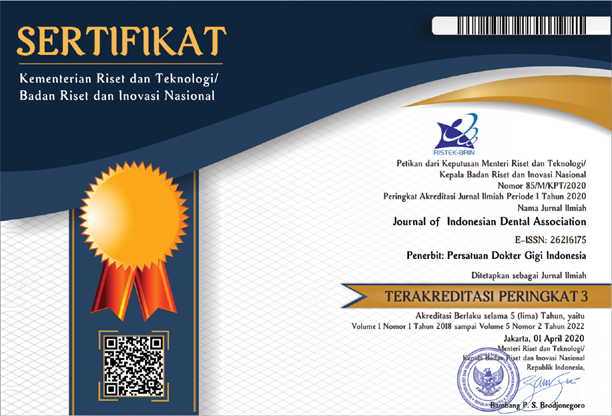The Effect of Glycerin Application on The Surface of Microhybrid Composite Resin to Its Compressive Strength with Immersed in Pure Coffee Solution
Abstract
Introduction: There are various restoration materials, one of which is microhybrid composite resin. An effective way to increase its compressive strength is by applying glycerin before curing. This can minimize the formation of a layer of OIL (Oxygen inhibition layer) which is formed due to polymerization that interrupted by the contact of composite resin with oxygen. Exposure with acidic solution such as pure coffee solution causing the occurrence of matrix degradation which can decrease the compressive strength of microhybrid composit. The longer its immersed in pure coffee solution, the more polymer bonds are broken and releasing monomer which result in a decrease of compressive strength.
Objective: This study aimed to reveal the effects of glycerin application on the compressive strength of microhybrid composite resins immersed in pure coffee solution.
Methods: There are 6 sample groups of composite resin namely: group SG, group S, group GK16, group K16, group GK32, and group K32 with 4 samples per group. Each sample made of microhybrid composite resin brand Filtek Z250 shaped disc with a diameter of 4 mm and thickness of 2 mm. Glycerin was applied to the surfaces of three groups before curing, while other groups were not. After treatment, all samples are compressive strength tested using Universal Testing Machine. The data were analyzed using the Two Way ANOVA followed by Post-Hoc LSD test.
Result: The groups with glycerin had higher compressive strength than those groups without glycerin application. The non-immersed groups had a higher hardness level than those groups which were immersed. The Two-Way ANOVA test confirmed that there was a statistically significant difference (p<0.05) among all groups.
Conclusion: Glycerin application can increase the compressive strength of microhybrid composite resin immersed in pure coffee solution by minimizing OIL formation on its surface.
ABSTRAK
Pendahuluan: Terdapat berbagai bahan restorasi, salah satunya yaitu resin komposit microhybrid. Cara yang efektif untuk meningkatkan kekuatan tekan resin komposit microhybrid adalah mengoleskan gliserin sebelum curing. Hal ini dapat meminimalisir pembentukan OIL (Oxygen Inhibition Layer) pada permukaan komposit yang terbentuk akibat polimerisasi terganggu oleh kontak resin komposit dengan oksigen. Kontak dengan larutan bersifat asam seperti larutan kopi murni mampu menyebabkan terjadinya degradasi matriks yang dapat menurunkan kuat tekan komposit microhybrid. Semakin lama resin komposit microhybrid direndam dalam larutan kopi murni, maka semakin banyak polimer yang terputus dan melepaskan monomernya yang berakibat penurunan kekuatan tekan.
Tujuan: Untuk mengetahui pengaruh aplikasi gliserin terhadap kekuatan tekan resin komposit microhybrid dalam perendaman larutan kopi murni.
Metode: Sampel dibagi menjadi 3 kelompok yaitu kelompok kontrol (sebelum perendaman), kelompok perlakuan (diaplikasi gliserin), kelompok perlakuan (tanpa aplikasi gliserin). Tiap sampel dibuat dari resin komposit microhybrid merk Filtek Z250 dibentuk cakram dengan diameter 4 mm dan ketebalan 2 mm. Gliserin diaplikasikan di atas permukaan resin komposit pada tiga kelompok, sedangkan kelompok lainnya tidak. Setelah perlakuan, semua kelompok dilakukan uji kekuatan tekan menggunakan Universal Testing Machine. Data dianalisa menggunakan Two Way Anova dilanjutkan dengan uji Post-Hoc LSD.
Hasil: Kekuatan tekan kelompok dengan aplikasi gliserin lebih tinggi dibandingkan tanpa gliserin. Selain itu, kelompok tanpa perendaman dalam larutan kopi murni memiliki kekuatan tekan lebih tinggi dibandingkan dengan perendaman. Hasil uji Two Way ANOVA menunjukkan adanya perbedaan signifikan (p<0,05) antar semua kelompok.
Kesimpulan: Aplikasi gliserin dapat meningkatkan kekuatan tekan resin komposit microhybrid dalam perendaman larutan kopi murni melalui minimalisir pembentukan OIL pada permukaannya.
References
Andari ES, Erawati W, DMC Robin. Efek larutan kopi robusta terhadap kekuatan tekan resin komposit nanofiller. Stogmatognatic. 2014;1(1):9.
Sakaguchi R, Ferracane J, Powers J. Craig's restorative dental materials. 14th ed. St. Louis: Elsevier; 2019.
Anusavice KJ, Shen C, Rawls HR. Phillip’s science of dental materials. 12th ed. Texas: Elsevier; 2013.
Park HH, Lee IB. Effect of glycerin on the surface hardness of composite after curing. J Korean Acad Conserv Dent. 2011;36(6):484.
Nurhapsari A, Andina KRP. Penyerapan air dan kelarutan resin komposit tipe microhybrid, nanohybrid, packable dalam cairan asam. Odonto Dent J. 2018;5(1):67.
Jannatun N. Kekerasan permukaan resin komposit nanofiller yang direndam dalam rebusan daun binahong (Anredera cordiffolia) dengan waktu perendaman berbeda [skripsi]. Medan: Fakultas Kedokteran Gigi Universitas Sumatra Utara; 2019.
Tangkudung MU, Trilaksana AC. Glycerin for resin composite restoration: Literature review. Makassar Dent J. 2019;8(3):170-172.
Kafalia RF, Firdausy MD, Nurhapsari A. Pengaruh jus jeruk dan minuman berkarbonasi terhadap kekerasan permukaan resin komposit. Odonto Dent J. 2017;4(1):38.
Sakaguchi R, Ferracane J, Powers J. Craig's restorative dental materials. 14th ed. St. Louis: Elsevier; 2019.
Anusavice KJ, Shen C, Rawls HR. Phillip’s science of dental materials. 12th ed. Texas: Elsevier; 2013.
Park HH, Lee IB. Effect of glycerin on the surface hardness of composite after curing. J Korean Acad Conserv Dent. 2011;36(6):484.
Nurhapsari A, Andina KRP. Penyerapan air dan kelarutan resin komposit tipe microhybrid, nanohybrid, packable dalam cairan asam. Odonto Dent J. 2018;5(1):67.
Jannatun N. Kekerasan permukaan resin komposit nanofiller yang direndam dalam rebusan daun binahong (Anredera cordiffolia) dengan waktu perendaman berbeda [skripsi]. Medan: Fakultas Kedokteran Gigi Universitas Sumatra Utara; 2019.
Tangkudung MU, Trilaksana AC. Glycerin for resin composite restoration: Literature review. Makassar Dent J. 2019;8(3):170-172.
Kafalia RF, Firdausy MD, Nurhapsari A. Pengaruh jus jeruk dan minuman berkarbonasi terhadap kekerasan permukaan resin komposit. Odonto Dent J. 2017;4(1):38.
Published
2022-05-17
How to Cite
AMALA, Farina Nur; NUGROHO, Raditya; LESTARI, Sri.
The Effect of Glycerin Application on The Surface of Microhybrid Composite Resin to Its Compressive Strength with Immersed in Pure Coffee Solution.
Journal of Indonesian Dental Association, [S.l.], v. 5, n. 1, p. 15-19, may 2022.
ISSN 2621-6175.
Available at: <http://jurnal.pdgi.or.id/index.php/jida/article/view/744>. Date accessed: 01 mar. 2026.
Issue
Section
Research Article

This work is licensed under a Creative Commons Attribution-NonCommercial 4.0 International License.












